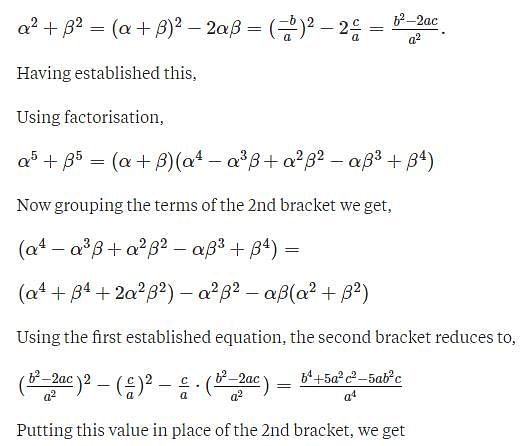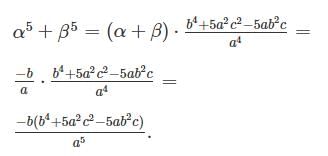JEE Exam > JEE Questions > If alpha,beta are the roots of equation ax^(2...
Start Learning for Free
If alpha,beta are the roots of equation ax^(2) bx c=0, then write alpha^(5) beta^(5) in terms of a,b,c?
Verified Answer
If alpha,beta are the roots of equation ax^(2) bx c=0, then write alph...
Ans.


Let us sort out a thing,


 This question is part of UPSC exam. View all JEE courses
This question is part of UPSC exam. View all JEE courses
Most Upvoted Answer
If alpha,beta are the roots of equation ax^(2) bx c=0, then write alph...
Alpha and Beta as Roots of the Quadratic Equation
To find the expression for alpha^5 * beta^5 in terms of a, b, and c, we need to understand the relationship between the roots of a quadratic equation and its coefficients. Let's consider a quadratic equation of the form ax^2 + bx + c = 0.
Using Vieta's Formulas
Vieta's formulas provide a relationship between the roots of a quadratic equation and its coefficients. According to Vieta's formulas, the sum of the roots (alpha + beta) is equal to -b/a, and the product of the roots (alpha * beta) is equal to c/a.
Expanding (alpha * beta)^5
Now, let's expand the expression (alpha * beta)^5 using the binomial theorem.
The binomial theorem states that for any positive integer n, the expansion of (a + b)^n can be written as:
(a + b)^n = C(n, 0) * a^n * b^0 + C(n, 1) * a^(n-1) * b^1 + C(n, 2) * a^(n-2) * b^2 + ... + C(n, n-1) * a^1 * b^(n-1) + C(n, n) * a^0 * b^n
Where C(n, r) represents the binomial coefficients, given by C(n, r) = n! / (r! * (n-r)!), and n! denotes the factorial of n.
Expanding (alpha * beta)^5
Applying the binomial theorem to (alpha * beta)^5, we have:
(alpha * beta)^5 = C(5, 0) * alpha^5 * beta^0 + C(5, 1) * alpha^4 * beta^1 + C(5, 2) * alpha^3 * beta^2 + C(5, 3) * alpha^2 * beta^3 + C(5, 4) * alpha^1 * beta^4 + C(5, 5) * alpha^0 * beta^5
Simplifying this expression, we get:
(alpha * beta)^5 = alpha^5 * beta^0 + 5 * alpha^4 * beta^1 + 10 * alpha^3 * beta^2 + 10 * alpha^2 * beta^3 + 5 * alpha^1 * beta^4 + alpha^0 * beta^5
Since beta^0 = 1 and alpha^0 = 1, we can simplify further:
(alpha * beta)^5 = alpha^5 + 5 * alpha^4 * beta + 10 * alpha^3 * beta^2 + 10 * alpha^2 * beta^3 + 5 * alpha * beta^4 + beta^5
Using Vieta's Formulas Again
Now, let's express alpha^5 * beta^5 in terms of the coefficients a, b, and c. We can rewrite the expression above by substituting the values of alpha * beta and alpha + beta using Vieta's formulas.
(alpha * beta)^5 = alpha^5 + 5 * alpha^4 * beta + 10 * alpha^3
To find the expression for alpha^5 * beta^5 in terms of a, b, and c, we need to understand the relationship between the roots of a quadratic equation and its coefficients. Let's consider a quadratic equation of the form ax^2 + bx + c = 0.
Using Vieta's Formulas
Vieta's formulas provide a relationship between the roots of a quadratic equation and its coefficients. According to Vieta's formulas, the sum of the roots (alpha + beta) is equal to -b/a, and the product of the roots (alpha * beta) is equal to c/a.
Expanding (alpha * beta)^5
Now, let's expand the expression (alpha * beta)^5 using the binomial theorem.
The binomial theorem states that for any positive integer n, the expansion of (a + b)^n can be written as:
(a + b)^n = C(n, 0) * a^n * b^0 + C(n, 1) * a^(n-1) * b^1 + C(n, 2) * a^(n-2) * b^2 + ... + C(n, n-1) * a^1 * b^(n-1) + C(n, n) * a^0 * b^n
Where C(n, r) represents the binomial coefficients, given by C(n, r) = n! / (r! * (n-r)!), and n! denotes the factorial of n.
Expanding (alpha * beta)^5
Applying the binomial theorem to (alpha * beta)^5, we have:
(alpha * beta)^5 = C(5, 0) * alpha^5 * beta^0 + C(5, 1) * alpha^4 * beta^1 + C(5, 2) * alpha^3 * beta^2 + C(5, 3) * alpha^2 * beta^3 + C(5, 4) * alpha^1 * beta^4 + C(5, 5) * alpha^0 * beta^5
Simplifying this expression, we get:
(alpha * beta)^5 = alpha^5 * beta^0 + 5 * alpha^4 * beta^1 + 10 * alpha^3 * beta^2 + 10 * alpha^2 * beta^3 + 5 * alpha^1 * beta^4 + alpha^0 * beta^5
Since beta^0 = 1 and alpha^0 = 1, we can simplify further:
(alpha * beta)^5 = alpha^5 + 5 * alpha^4 * beta + 10 * alpha^3 * beta^2 + 10 * alpha^2 * beta^3 + 5 * alpha * beta^4 + beta^5
Using Vieta's Formulas Again
Now, let's express alpha^5 * beta^5 in terms of the coefficients a, b, and c. We can rewrite the expression above by substituting the values of alpha * beta and alpha + beta using Vieta's formulas.
(alpha * beta)^5 = alpha^5 + 5 * alpha^4 * beta + 10 * alpha^3
Attention JEE Students!
To make sure you are not studying endlessly, EduRev has designed JEE study material, with Structured Courses, Videos, & Test Series. Plus get personalized analysis, doubt solving and improvement plans to achieve a great score in JEE.

|
Explore Courses for JEE exam
|

|
Similar JEE Doubts
If alpha,beta are the roots of equation ax^(2) bx c=0, then write alpha^(5) beta^(5) in terms of a,b,c?
Question Description
If alpha,beta are the roots of equation ax^(2) bx c=0, then write alpha^(5) beta^(5) in terms of a,b,c? for JEE 2024 is part of JEE preparation. The Question and answers have been prepared according to the JEE exam syllabus. Information about If alpha,beta are the roots of equation ax^(2) bx c=0, then write alpha^(5) beta^(5) in terms of a,b,c? covers all topics & solutions for JEE 2024 Exam. Find important definitions, questions, meanings, examples, exercises and tests below for If alpha,beta are the roots of equation ax^(2) bx c=0, then write alpha^(5) beta^(5) in terms of a,b,c?.
If alpha,beta are the roots of equation ax^(2) bx c=0, then write alpha^(5) beta^(5) in terms of a,b,c? for JEE 2024 is part of JEE preparation. The Question and answers have been prepared according to the JEE exam syllabus. Information about If alpha,beta are the roots of equation ax^(2) bx c=0, then write alpha^(5) beta^(5) in terms of a,b,c? covers all topics & solutions for JEE 2024 Exam. Find important definitions, questions, meanings, examples, exercises and tests below for If alpha,beta are the roots of equation ax^(2) bx c=0, then write alpha^(5) beta^(5) in terms of a,b,c?.
Solutions for If alpha,beta are the roots of equation ax^(2) bx c=0, then write alpha^(5) beta^(5) in terms of a,b,c? in English & in Hindi are available as part of our courses for JEE.
Download more important topics, notes, lectures and mock test series for JEE Exam by signing up for free.
Here you can find the meaning of If alpha,beta are the roots of equation ax^(2) bx c=0, then write alpha^(5) beta^(5) in terms of a,b,c? defined & explained in the simplest way possible. Besides giving the explanation of
If alpha,beta are the roots of equation ax^(2) bx c=0, then write alpha^(5) beta^(5) in terms of a,b,c?, a detailed solution for If alpha,beta are the roots of equation ax^(2) bx c=0, then write alpha^(5) beta^(5) in terms of a,b,c? has been provided alongside types of If alpha,beta are the roots of equation ax^(2) bx c=0, then write alpha^(5) beta^(5) in terms of a,b,c? theory, EduRev gives you an
ample number of questions to practice If alpha,beta are the roots of equation ax^(2) bx c=0, then write alpha^(5) beta^(5) in terms of a,b,c? tests, examples and also practice JEE tests.

|
Explore Courses for JEE exam
|

|
Suggested Free Tests
Signup for Free!
Signup to see your scores go up within 7 days! Learn & Practice with 1000+ FREE Notes, Videos & Tests.

























